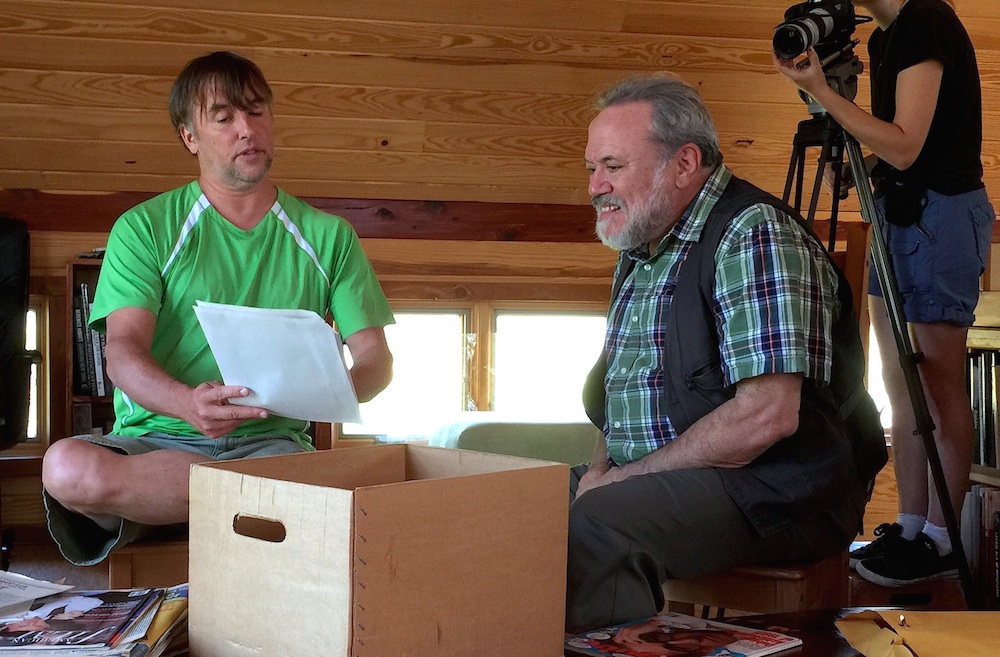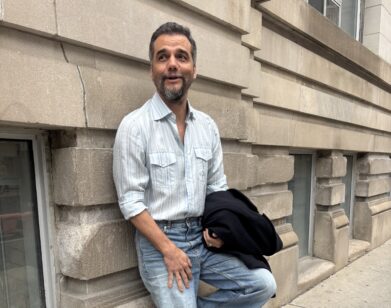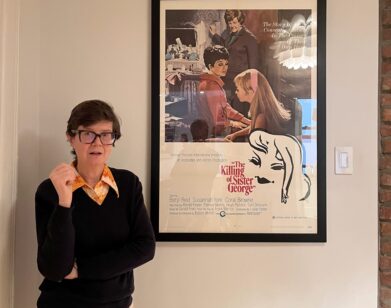Austin’s Film Pioneers

ABOVE: RICHARD LINKLATER (LEFT) AND LOUIS BLACK IN RICHARD LINKLATER: DREAM IS DESTINY.
“I have a true love for people,” Albert Maysles said in 2012. “I have no difficulty getting and keeping access, because if something comes up that’s gonna be hurtful, they know—whether I put the camera down or not—that I’m not going to use it.”
The relationship between a documentary filmmaker and his or her subject is a controversial one: is it better to maintain some distance or to embrace personal feelings toward your subject? The new Sundance documentary Richard Linklater: Dream Is Destiny is a good argument for the latter. Co-directed by Linklater’s close friend Louis Black and experienced documentarian Karen Bernstein, it is not an exposé, but rather a loving reconstruction of filmmaker Linklater’s creative trajectory, from his seminal 1991 film Slacker through Dazed and Confused, the Before Sunrise series, Boyhood, and his forthcoming Everybody Wants Some. Austin, Texas—and Black and Linklater’s shared history as long time residents of the city—serves as the film’s anchor. “It’s about me and where I fit into the [Austin] culture,” says Linklater. “But there wouldn’t really be much of an Austin culture if it weren’t for Louis.”
When the idea for a documentary first came about, Linklater was not the most eager subject. “It hit me at a time where I felt like I’d been over-documented,” he explains. It was his relationship with Black, who co-founded both The Austin Chronicle and SXSW, that convinced him to participate. “Rick actually never said yes,” Black says with a laugh. “But there were specific moments where he didn’t say no.”
We sat down with Black, Bernstein, and Linklater at the Sundance Film Festival in Park City, Utah.
EMMA BROWN: Louis, was your relationship with Rick ever a hindrance in making a documentary about him?
LOUIS BLACK: No, because I knew from the very beginning that I wasn’t interested in making a documentary about Rick and his personal life. I was interested in making a documentary about Rick and his cinematic, creative life. There, I knew I had no real concerns. There are some films that he probably likes more than I do; there are some films I might like more than he does. But it’s not even that, it’s that I knew what the turf was going to be. I wasn’t sure we were going to do it right, but I knew what the turf was going to be.
BROWN: I know you and Rick talk about movies frequently as friends. Did you learn anything new about Rick in making this documentary?
BLACK: This is going to sound obnoxious, [but] I’m more impressed with Rick and his career than ever. He made a Super 8 film called It’s Impossible to Learn to Plow by Reading Books. I knew him at this point and was supportive of the [Austin] Film Society. Then he made Slacker a few years later. When we were interviewing Kevin Smith for the documentary, Kevin said to us, “Well, you must have gotten to see Plow when Rick first made it.” And I hadn’t. Was this because I was so wrapped up in doing The Austin Chronicle? Rick was persistent, so if he had done a screening he would’ve mentioned it to the point where we would’ve probably gone. It was that there hadn’t been a screening. He had made the film for himself—to finish a film. Then he follows with Slacker, which becomes this amazingly important indie film both culturally and cinematically. And then he follows that with Dazed, which is the most sure-handed Hollywood comedy. The whole thing was watching that happen. And I got to watch it up close.
BROWN: Rick, there’s this moment in the film where you’re going through your old script ideas, and you say that by the time you had the ability to make some of them you were no longer interested. How often has that happened to you?
RICHARD LINKLATER: That happens a lot. I think James Brown, the famous experimental filmmaker, said that the most important films are the ones you make in your head and that you never manifest to film. I always thought, “What does that mean?” But if you can make something in your head and it’s done and it’s not still growing, then don’t make it. I have a lot of films that die at that point. You go down the road a bit and it’s just not compelling you to another level. It’s finished. A 10-year gestation period sounds kind of funny but for the film I just finished, I had a 10-year period of thinking about it before I finally got to make it. It’s a good litmus test, if you’re still thinking about it. It’s okay for things to die at a certain stage.
BROWN: Did you get to see cuts of the documentary when Louis and Karen were editing it, or only the final one?
LINKLATER: They sent me a link and I finally saw it around Christmas.
KAREN BERNSTEIN: He was absolutely great, I have to say. I think a lot of subjects would have felt the need to kibbitz, which is what I call it, but he really never did. The main reason we wanted to show it to him was to make sure we weren’t crossing some big personal line. There was quite a bit of trust there.
LINKLATER: Yeah. There’s nothing factually inaccurate. It’s weird to see your creative life filtered through other people, whatever that is. But that said, I had no complaints.
BROWN: In the film you mention that you visited studio films sets before making Dazed and Confused. Do you remember the first film set you were on?
LINKLATER: Texas Chainsaw Massacre 2 was filming in Austin and I had some friends working on it, so I kind of hung out a little bit, which was fun.
BLACK: It was Kit?
LINKLATER: Yeah, Kit was around. I interviewed Kit for a thing. It was the whole Austin crowd. Lee Daniel was a loader. He wasn’t even a first assistant; he was a second assistant. I was just like, “Wow, this is too big.” And that was just a low-budget canon exploitation film. I thought there had to be a simpler way.
BERNSTEIN: Was that the one that Matthew [McConaughey] is in?
LINKLATER: No, that was after Dazed. This was ’86 or so.
BLACK: So Dennis Hopper. Imagine what that set must’ve been like with Tobe [Hooper] and Dennis… real mad men.
LINKLATER: Although Hopper was famously sober by then.
BLACK: Really?
LINKLATER: He sobered up in, like, ’83.
BLACK: Tobe, Kit… Great guys.
LINKLATER: Great guys.
BROWN: Louis, this is your first film as a director. Would you have gone into directing if it weren’t for this film?
BLACK: I’ve been really lucky in that I’ve gotten to do an enormous number of different things. I’ve backed into directing and there’s probably nothing that I was better suited to do. Then having Karen and Nevie [Owens] and that team, not only put together remarkable archival footage, but really get everything possible to look at… It was very hard, because making movies is very hard, but in other ways it was easy. I’ve done things where I’m starting and it’s such a struggle because everything you have to re-invent. [With this,] I was given an enormous amount of wonderful material.
BERNSTEIN: There are always 50 ways of making any portrait. A lot of it is trying to figure out what kind of film we were trying to make, and that’s an interesting conversation. We were trying to figure out how much should Louis be in it, and we were having debates in the edit room about, “Should he be in it? Should he not be in it?” You were always pretty great about it considering it was you that we were talking about.
BLACK: I thought if it worked, great, if it didn’t work, fine.
BROWN: Is there any footage you’re particularly sad about having cut?
BLACK: The [Marissa] Ribisi scene. It was four and a half minutes long, and it was wonderful. It was Matthew and the red headed girl and they’re flirting. I didn’t even realize it was Matthew’s first day on set until [he hosted] Saturday Night Live. Matthew showed up and he had wowed this casting agent. He had a very small part and Rick instantly began to expand it, and said, “What if you flirt?” The scene where the two of them flirt is such an amazing scene because it’s about outlaw culture coming together with intellectual culture in a very mild but high school, meaningful way. It’s one of the reasons the films resonates. So we have this four and a half minute scene about how it came together so collaboratively, but it just took too much time.
BERNSTEIN: Now I kind of regret it, because it’s a great example of how Rick doesn’t look at a script as being the final product. It’s malleable; things can change.
LINKLATER: I remember being relieved when I saw your film because I was thinking it seemed to emphasize process and community. I think people don’t really understand films or how they get made.
BLACK: Remember the early days of the [Austin] Film Society?
LINKLATER: I remember it so well that I really appreciate others doing the hard work [now].
BLACK: You’d sweep the floor, you’d take the prints…
BERNSTEIN: Actually, if there’s anything I regret having cut, it’s this wonderful sequence at one point of Clark Walker and Tommy talking about the early days of the Austin Film Society, and how it really was almost completely Rick. How any given moment he was on the phone, he was making Xeroxes…
LINKLATER: How do I have a full time job that pays zero? [laughs]
BLACK: One of the things was, if you had to mail three 16mm films, it was really a pain in the ass. Frequently it would take an extra day, and then I’d have a late fee.
LINKLATER: From the distributor. They’d nail you with $20.
BLACK: “I have so much to do today, I don’t want to have to get to the post office.” It was a different world.
BROWN: Rick, in the film, some of the actors you’ve worked with say that certain directors just want good puppets, whereas you’re interested in hearing from the actor and having the actor bring something. Do you find people are generally receptive to that way of working? I know Shirley MacLaine was a bit resistant, but aside from that.
LINKLATER: Most actors are like, “You want to listen to what I really have to say about my character?” “Yeah, that’s what we’re doing for three weeks.” For actors, it’s kind of like theater. Even though films are very different, if you’re a trained actor, that’s how you approach it. In TV and film, they know they’re going to show up, say their lines, hit the mark, and often they look at it a different way, so I try to bring out that part in them that wants to have a much deeper collaboration. Overwhelmingly—99 out of 100—[respond to it].
The only resistance I’ve gotten, it’s always older actors who have been burned a lot. They’re just a little bit more hesitant to give so much of themselves, and I really want everything. I’m trying to include them and really pull stuff out of them to take it to some other level. The kind of actor I don’t really like—and it doesn’t always have to do with age—is like, “I’ve got my character.” “Oh, do you? Because I want your character to be something that neither of us can imagine just yet. I want to find something else.” But if they’re too professional, too veteran, it’s their 79th movie, [they can be like,] “I got it.” An artist wouldn’t do that, but some professional actors, it’s a combination of protecting themselves and totally controlling themselves: “You’re going to get what I give you, and nothing more, because I gave more and they made me look stupid.” It’s a careful thing. Very rarely have I felt like I hit a wall with an actor where they didn’t want to go deeper. If they’re an artist that’s what they’re there to do.
BLACK: It makes Marco Perella’s performance in Boyhood even more remarkable. It’s the meatiest role of his career and he just nails it.
LINKLATER: Because he found that. Marco’s the nicest guy in the world, but he knew he could go there.
BERNSTEIN: And with Everybody Wants Some, there were just so many young actors—there were, what, four different actors who had never been in a movie before?
LINKLATER: Maybe six or seven. [laughs] A lot. With a lot of the Dazed guys, it was their first time. It works well with people who haven’t acted much because it’s the way that you would do it. I’ve had people call me from their next film set and go, “Rick, I’m having a miserable time, I tried to talk to someone and they just said no and walked off.” They’re not collaborating in the same way. Every film’s different, every collaboration’s different. I’m in a unique position in my own films because I set the tone. Ethan Hawke goes on to do different films, they’re all very different, but mine are kind of the same, because I’m controlling it. It’s a director’s medium to say the least.
BROWN: Did you always keep a diary?
LINKLATER: No, just sporadically throughout my life. Not much lately. I did a little video diary for a while in the early days. I wonder if I’m losing or gaining anything by not doing that these days.
BERNSTEIN: But your journals are beyond journals. They’re nothing like the diaries I had at that age. My diaries are just like, “Why doesn’t he like me anymore?” [laughs] You were quite intellectual, I thought. You were thinking things through.
LINKLATER: Maybe that’s what I used it for—it wasn’t what was going on in my life so much as me thinking through whatever process.
BROWN: In the film, your stepmother says that she thought you were going to be a sportswriter. Is that something you ever considered?
LINKLATER: [laughs] No, never. I think parents, when you want to do something, they give you the practical version. “Well you play sports, and you’re a writer, you should be a sportswriter.” Even from high school people were like, “Do you want to write for Sports Illustrated?” And I was like “No, I want to write novels, I don’t want to be a fucking sports writer.” I knew enough to know that’s not what I wanted to do. That’s just a parent hoping you have a job, I think.
BERNSTEIN: She wrote to say she really liked the film, I meant to tell you that.
LINKLATER: Oh, that’s sweet. A sportswriter. That’s funny. I wrote on my high school paper, but I wrote editorials. I don’t think I even wrote sports for my high school paper. I wrote concert reviews and record reviews and editorials.






